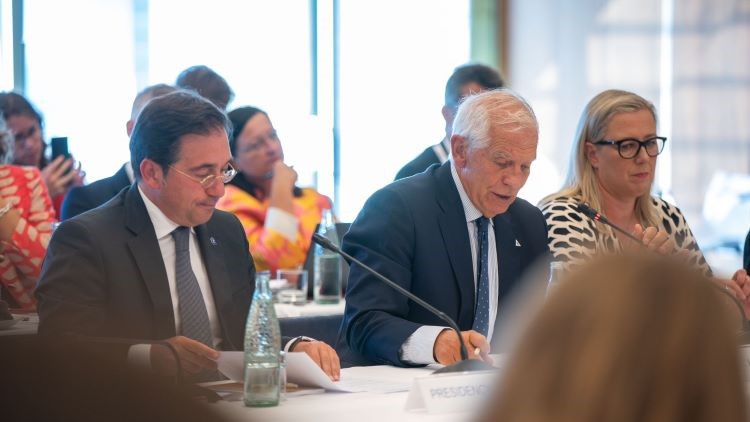The Diplomat
The Minister of Foreign Affairs, José Manuel Albares, warned yesterday before the EU and the UN of the need to “redouble efforts” to achieve the goals of the 2030 Agenda and gave as an example the Government of Spain, which through its new Development Law “has put the 0.7 target as a goal by law” and has “more than tripled” its development programs in different parts of the world.
Albares made these statements to journalists at the end of the first day of the informal meeting of ministers of development cooperation of the European Union, held since yesterday in Cadiz in the framework of the Spanish Presidency of the EU and which will continue today with the presence of the High Representative of the European Union for Foreign Affairs and Security Policy, Josep Borrell.
The ministers of the 27 EU Member States have been meeting since yesterday in Cadiz to define their joint policy in this area, which is one of the main lines of action of the Spanish Presidency of the Council of the European Union.
The first day began with a working session at the Parador de Cadiz in which Albares, Borrell, the ministers of development and (via videoconference) the UN Deputy Secretary-General, Amina Mohammed, participated, and in which they addressed “how the EU, the Member States and the UN can give new impetus to the 2030 Agenda for Sustainable Development,” as reported by the minister through his official Twitter account. Albares also held a meeting with the chairman of the European Parliament’s Development Committee, the Swede Tomas Tobé, with whom he discussed “the priorities of the Spanish Presidency in the field of development: gender equality, support for the triple green, digital and social transition and the EU’s new cooperation instruments.”
At the end of this first day, Albares told journalists that during the meetings various issues had been addressed in which the European Union and the United Nations must work “side by side”, such as the 2030 Agenda for Sustainable Development Goals (SDGs) and multilateral financing for developing countries.
Also, he continued, the situation in Niger, the coup d’état in Gabon and “the need to find new funding to address humanitarian crises and development crises” following Russia’s aggression in Ukraine were discussed. “All of that we have started to talk about today, in a year that is crucial, when we are just a few weeks away from having a summit on the Sustainable Development Goals and the 2030 Agenda at the United Nations,” he continued.
“2030 is already right next door” he warned. For that reason, he added, “we have to redouble our efforts for it, as the Government of Spain has done with a new Development Law that has put the 0.7 target as a goal for the first time in the history of Spain by law and we have more than tripled our development programs in different parts of the world.”
The minister will not be able to participate today in the second day of the meeting (to be held at the Congress’ Palace of Cadiz) for “agenda reasons”, specifically because of the celebration of the Council of Ministers in Madrid and because of some usual internal office matters, according to what Ministry sources confirmed to The Diplomat, without further details. In her place, the State Secretary for International Cooperation, Pilar Cancela, will attend. Today’s meeting will begin at 8:15 a.m. and will conclude at around 2 p.m. with an official press conference.
The European Union is the world’s largest donor of official development assistance and currently cooperates with 150 countries in Africa, Latin America, the Caribbean, Asia and the Pacific to eradicate poverty and promote sustainable development. In 2022, the EU institutions and member countries together donated 92.8 billion euros, which accounted for more than 43 % of global aid. The European Union’s development cooperation policy is dealt with at the Foreign Affairs Council, whose meetings are chaired by Josep Borrell.







